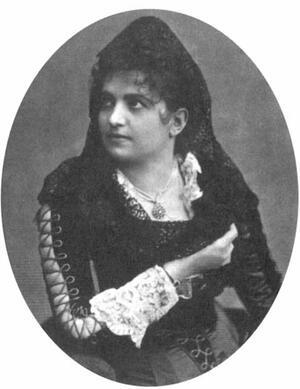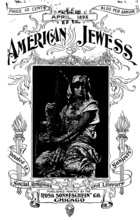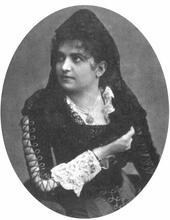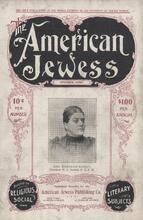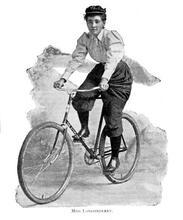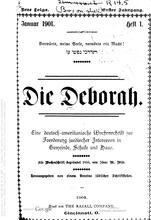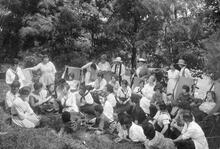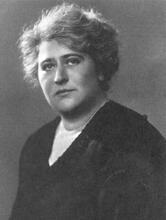Rosa Sonneschein
An ardent Zionist and advocate for an expanded role for women in the synagogue and religious community, Rosa Sonneschein founded and edited The American Jewess, which gave her a forum for those views.
Institution: The Jacob Rader Marcus Center of the American Jewish Archives, Cincinnati, OH, www.americanjewisharchives.org and the State Historical Society, MO
As the wife of a prominent Reform rabbi in St. Louis, Rosa Sonneschein used her role as a public figure in the Jewish community to participate in the city’s literary circles. In 1879, she founded the Pioneers, a Jewish women’s literary society, and began writing for Jewish periodicals and the German-language press. During the World’s Columbian Exposition in Chicago, she articulated the need for a magazine specifically addressing American Jewish women. In 1895, she began editing the American Jewess, and she remained its editor throughout its four-year run. In the magazine, Sonneschein advocated for the expansion of women’s roles in the synagogue and the Jewish community and expressed her strong support for Zionism. In 1897, she was one of only four American attendants at Second Zionist Congresses.
Overview and Early Life
On April 13, 1895, the Chicago Evening Journal welcomed the premiere of the American Jewess and praised its editor, Rosa Sonneschein. “Until three years ago,” the Journal effused, she was “one of the best known society women in St. Louis, a prominent figure in literary circles, and an active worker in the field of charity, independent of creed or nationality.” Writer, journalist, and clubwoman, Rosa Sonneschein founded the American Jewess, the first English-language magazine for Jewish women in the United States, to be a voice and forum for American Jewish clubwomen. Through it, Sonneschein strongly supported, as well as criticized, the National Council of Jewish Women and crusaded for women’s membership and expanded roles in the synagogue and for Zionism.
Born in Prostejov, Moravia, Austria, on March 12, 1847, Rosa Sonneschein was the daughter of Fannie (Sternfeld) and Hirsch Bär Fassel, a respected scholar and moderate Reform rabbi. Rosa grew up as the youngest daughter in an upper-middle-class home in Nagykanizsa, Hungary, and received an education at home and the local high school that was remarkably thorough for a nineteenth-century girl. In 1864, she married Solomon Hirsch Sonneschein, a young radical Reform rabbi with a congregation in Warasdin, Croatia. In the next five years, the Sonnescheins moved to successive posts in Prague, New York City, and finally, in 1869, St. Louis, where they remained for about twenty years.
Rosa and Solomon Sonneschein had four children: Ben, born in Warasdin in 1865; Fanny (Loth), born in Prague in 1866; Leontine (Pomeroy), born in Prague in 1868; and Monroe, born in St. Louis in 1873. Fanny followed her mother to become active in women’s literary clubs. Monroe contributed several poems, stories, and articles to the American Jewess.
A Jewish Leader in St. Louis
During the years Rosa Sonneschein spent as a (Yiddish) Rabbi's wife; title for a learned or respected woman.rebbetzin [rabbi’s wife] in St. Louis, she was a public figure in the city’s Jewish community. She helped lead the “Ladies’ Meetings” and organized the choral society at the two St. Louis congregations Solomon Sonneschein served. Her position as a rebbetzin also enabled her to move beyond the Jewish community, participating in literary circles and the city’s German cultural life. In 1879, she founded the Pioneers, a Jewish women’s literary society. Modeled on similar Christian women’s clubs, the Pioneers devoted themselves not to studying Jewish literature, but to cultivating general literary taste and knowledge. Perhaps encouraged by club experiences, Sonneschein began to publish stories in Jewish periodicals at least as early as the mid-1880s. Her standing in both the German and Jewish communities and her frequent European travels positioned Sonneschein well as a correspondent for the German-language press, and her reports on world expositions in Paris, St. Louis, and Chicago gained her some prominence.
During their years in St. Louis, Rosa and Solomon Sonneschein projected the image of a united couple, but they quarreled frequently. They had intellectual disagreements, most notably over the wisdom of Zionism, but personal problems overshadowed these in plaguing their relationship. Mutual charges of infidelity and financial irresponsibility, exacerbated by their roles as public figures in the Jewish community and representatives of it to those outside, made the Sonnescheins’ marriage untenable, and they separated in 1891. Rosa first broached the idea of divorce, but she ultimately allowed Solomon to sue, wishing “to be rid of him, not ruin him.” Their divorce was finalized in April 1893.
After the divorce, Rosa Sonneschein’s journalistic skills proved essential, as she received no alimony. Through writing, she not only supported herself, but also gained some fame. At a panel of representative presswomen during the May 1893 Press Congress, held as part of the World’s Columbian Exposition in Chicago, she spoke on “Newspaperwomen in Austria.” During this speech Sonneschein articulated the need for a magazine specifically addressing American Jewish women.
The exposition also featured the Jewish Women’s Congress, held in September 1893. The congress brought together prominent middle-class Jewish women from Chicago and across the country to discuss literary, philanthropic, and religious questions. Here, Sonneschein likely garnered support for her proposed magazine, and lent her support to the permanent organization the congress created, the National Council of Jewish Women (NCJW).
Publishing the American Jewess and Zionist Advocacy
Sonneschein remained in Chicago after the exposition, and in April 1895 she began editing the American Jewess. At first she also published and managed the business affairs of the magazine. Finding the workload too heavy and the finances too tight, she hired a business manager and opened additional offices in New York in 1896. Financial troubles persisted, however, leading Sonneschein to sell the magazine in 1898, though she retained editorship. Despite the efforts of the new owners, the American Jewess’s financial situation did not improve; its August 1899 issue was its last.
Throughout the run of the American Jewess, Sonneschein advocated for the expansion of women’s roles in the synagogue and the Jewish community. It was in this regard that she believed the NCJW could contribute. Rather than focus its main efforts on philanthropy, which, she argued, many other Jewish organizations pursued successfully, Sonneschein asserted that it should concentrate on promoting greater religious unity and observance (particularly Sabbath observance) in the American Jewish community, a task for which she believed Jewish women especially well suited.
Taking a stance that set her apart from the majority of her middle-class Jewish peers, Sonneschein also advocated for Zionism in the American Jewess’s pages. She viewed Zionism as a potential source of relief for oppressed Jews in Eastern Europe and a source of pride and a countermeasure to assimilation for Jews in America and Western Europe. Sonneschein attended and reported on both the First and Second Zionist Congresses in 1897 and 1898. At the former, she was one of only four American participants and twenty-one women attendees (out of approximately 250).
Rosa Sonneschein linked her advocacy of Zionism with her vision for the NCJW, arguing that by adopting Zionism as its credo, the organization could better reach out to immigrant Jewish women and thus become a truly representative, national organization. That the NCJW neither readily adopted her passion for Zionism nor pursued religious goals as its main focus disturbed Sonneschein. In her magazine’s last years, she became increasingly dissatisfied with and critical of the organization, though it is unclear whether she ever completely severed ties with it.
After the demise of the American Jewess in 1899, Sonneschein virtually disappeared from public life. She continued to write and travel, but never again was as publicly involved in the activities of Jewish women’s organizations or of the Zionist movement. After living intermittently with her daughter Fanny, Sonneschein returned to St. Louis, where she died on March 5, 1932. Although divorced for over thirty years, she was still memorialized in her obituary as Solomon Sonneschein’s widow.
By founding and editing the American Jewess, Rosa Sonneschein not only provided support and space for the emerging national network of Jewish clubwomen and created a forum in which to publicize her then unconventional views on Zionism, but also pioneered a professional role in journalism for American Jewish women.
Selected Works by Rosa Sonneschein
“The American Jewess.” American Jewess 6 (February 1898): 205–208.
“The National Council of Jewish Women and Our Dream of Nationality.” American Jewess 4 (October 1896): 28–32.
The Pioneers: An Historical Essay. Read Before the Society of Pioneers, May 18, 1880 (1880).
“Plucked from the Grave.” Jewish Messenger (New York), March 6, March 13, and March 20, 1885.
“Something About the Women’s Congress in Brussels.” American Jewess 6 (October 1897): 11–12.
“Three Kisses.” Translated from German by Mrs. Julius Wise. American Jews’ Annual 5645 (1884–1885): 76–82.
“The Zionist Congress.” American Jewess 6 (October 1897): 13–20.
AJYB 6 (1904–1905): 191.
AJH 68:57–63.
Binswanger, Augustus. Diaries 1870–1871. Augustus Binswanger Papers, AJA, Cincinnati, Ohio.
EJ (1973–1982).
Jacobson, Laura D. “The Pioneers.” American Jewess 1 (August 1895): 241–242.
Kraut, Benny. “A Unitarian Rabbi? The Case of Solomon H. Sonneschein.” In Jewish Apostasy in the Modern World, edited by Todd M. Endelman (1987).
Loth, David. “The American Jewess.” Midstream 31 (1985): 43–46, and “Notes on the Marital Discord of Solomon and Rosa Sonneschein,” and “Supplementary Memoir of the Sonnescheins.” Small Collections. AJA.
Loth, Fanny Sonneschein. “Autobiographical Questionnaire.” Small Collections. AJA.
Orlan, Haiyim. “The Participants of the First Zionist Congress.” In Herzl Year Book, vol. 6, Essays in Zionist History and Thought, edited by Raphael Patai (1964–1965)/
Porter, Jack Nusan. “Rosa Sonnenschein [sic] and The American Jewess: The First Independent English Language Jewish Women’s Journal in the United States.” AJH 67 (September 1978): 57–63, and “Rosa Sonneschein and The American Jewess Revisited: New Historical Information on an Early American Zionist and Jewish Feminist.” AJA 32 (1980): 125–131.
Sonneschein, Solomon H. Letterbooks, 1882–1893. Solomon H. Sonneschein Papers, AJA.
“Widow of Rabbi Sonneschein Dies.” St. Louis Globe-Democrat, April 6, 1932.
“A Woman’s Cultural Club.” Missouri Historical Society Bulletin 6 (1949–1950): 109.

